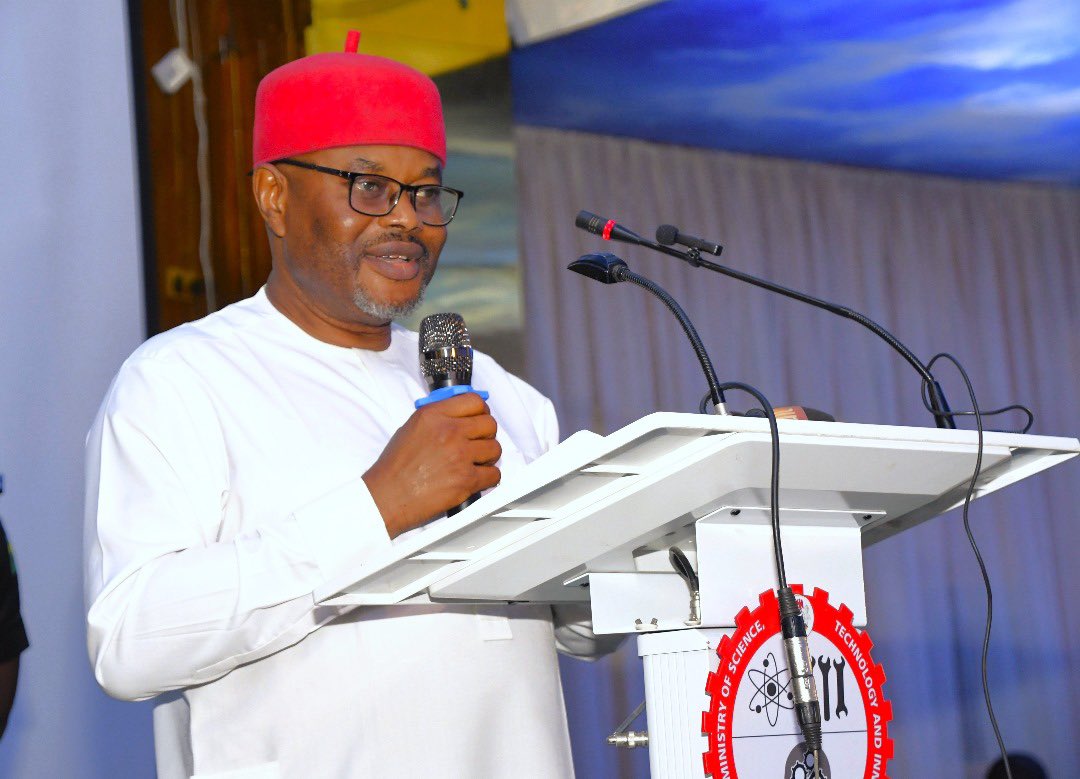President Bola Ahmed Tinubu has formally accepted the resignation of Geoffrey Uche Nnaji, the Minister of Innovation, Science, and Technology, following a series of allegations that have recently trailed the minister. The resignation, which took effect on Monday, October 7, 2025, marks the latest in a string of cabinet adjustments under the Tinubu administration, reflecting the President’s continued emphasis on integrity, accountability, and ethical conduct in public service.
In a letter addressed to President Tinubu, Nnaji expressed his gratitude for the opportunity to serve the nation in such a critical role. Appointed in August 2023, Nnaji had spent a little over two years in office, during which he oversaw several policy initiatives aimed at revitalizing Nigeria’s science, technology, and innovation ecosystem. His resignation comes amid allegations that he described as “politically motivated attempts at blackmail” by certain elements seeking to undermine his credibility and contributions.
“Serving Nigeria under your leadership has been a privilege of a lifetime,” Nnaji’s resignation letter partly read. “However, recent events and orchestrated campaigns of calumny against my person have made it necessary for me to step aside and protect the integrity of the office I occupy. I remain deeply committed to the success of your administration and the realization of its Renewed Hope Agenda.”
According to a statement released by Bayo Onanuga, Special Adviser to the President on Information and Strategy, President Tinubu acknowledged Nnaji’s decision with a sense of respect and appreciation for his contributions to the administration’s vision of technological transformation. The President thanked the former minister for his service, wishing him success in his future endeavors while emphasizing the government’s zero-tolerance stance on corruption, impropriety, and any conduct that could undermine public trust in governance.
“The President appreciates Mr. Nnaji’s service to the country and wishes him well in his future endeavors,” the official statement read in part.
A Tenure Marked by Reform and Controversy
During his time at the Ministry of Innovation, Science, and Technology, Geoffrey Nnaji was known for his push toward technological self-reliance, research-driven development, and industrial innovation. His tenure saw the introduction of several policy frameworks intended to boost the commercialization of research outputs, strengthen indigenous innovation, and encourage partnerships between academia and industry.
Under Nnaji’s leadership, the ministry worked on initiatives such as the National Research and Innovation Fund, the Artificial Intelligence Development Framework, and the revival of moribund science institutions across Nigeria. He was also instrumental in advancing digital innovation policies aimed at bridging the technology gap between Nigeria and other emerging economies.
However, his time in office was not without controversy. In recent months, allegations surfaced concerning the management of funds allocated to research grants and certain procurement-related decisions within the ministry. Although no formal charges have been filed, the controversies generated significant media attention and political debate, particularly among opposition figures who called for greater scrutiny of ministerial activities.
Nnaji, for his part, has consistently maintained his innocence, describing the accusations as deliberate attempts by political adversaries to tarnish his image and distract from the ministry’s achievements. His decision to resign, he noted, was taken in the “overall interest of the administration and the nation,” in order to allow for an impartial investigation and avoid unnecessary distractions.
Tinubu’s Response and the Broader Implications
President Tinubu’s acceptance of Nnaji’s resignation has been interpreted by analysts as another demonstration of his commitment to building a government defined by accountability and performance. Since assuming office in May 2023, the President has emphasized that ministers and public officials must uphold the highest standards of transparency and responsibility in service delivery.
“The President has made it clear that no one is indispensable,” a senior aide in the Presidency told reporters. “Every minister serves at the pleasure of the President, and when circumstances arise that call a minister’s integrity into question, the right and honourable thing is to step aside.”
Tinubu’s administration has already witnessed a few reshuffles since its inauguration, with resignations and reassignments reflecting a dynamic approach to governance. Observers believe the President’s swift acceptance of Nnaji’s resignation reinforces his determination to maintain public confidence in his cabinet and sustain momentum on national reform priorities.
The Presidency has yet to announce a replacement for Nnaji. However, sources close to Aso Rock indicate that an acting minister may be appointed in the interim to oversee the ministry’s operations pending a substantive appointment. The Ministry of Innovation, Science, and Technology is considered a critical pillar of the government’s economic diversification agenda, particularly in advancing Nigeria’s transition into a knowledge-based economy.
Public Reactions and Political Undertones
Reactions to Nnaji’s resignation have been mixed across political and public spheres. Some have praised the minister for choosing to resign rather than allow ongoing controversies to distract from government operations. Others have interpreted his exit as an indication of deeper internal tensions and the growing pressure on public officials to maintain spotless records in an era of heightened scrutiny.
Civil society organizations such as the Centre for Accountability and Development (CAD) have welcomed the move, calling it a “positive precedent for public office holders facing ethical questions.” A statement from the group noted, “Minister Nnaji’s resignation sends an important message that public service must be guided by honour and integrity. Nigeria needs leaders who can prioritize national interest above personal or political considerations.”
Conversely, some political commentators argue that the allegations against Nnaji were exaggerated and politically motivated. They suggest that the minister’s exit could embolden vested interests resistant to the reforms he championed in the innovation and research sectors.
A member of the House Committee on Science and Technology, who spoke on condition of anonymity, described Nnaji as a “victim of political machinations.” He said, “The minister was doing great work in repositioning our research institutions and fostering homegrown innovation. It is unfortunate that political pressures may have forced him out prematurely.”
Despite the controversy, Geoffrey Nnaji’s legacy in the Ministry of Innovation, Science, and Technology is likely to be remembered for his efforts to modernize the sector and reposition it as a driver of economic growth. His resignation, while significant, opens a new chapter in the Tinubu administration’s ongoing effort to strengthen governance and rebuild public confidence in national institutions.
As the government prepares to appoint a new minister, attention will turn to how swiftly the administration can sustain policy continuity in one of Nigeria’s most strategic ministries. Analysts say the next appointee will face the dual challenge of maintaining momentum on existing programs and restoring stability within the ministry’s leadership.
For President Tinubu, Nnaji’s resignation represents both a loss and an opportunity — a loss of a key technocrat, but also an opportunity to reaffirm his administration’s ethical code and governance philosophy.
With this development, the Tinubu government once again signals that no official, no matter how highly placed, is above accountability.







One Comment
He did the hourable thing.